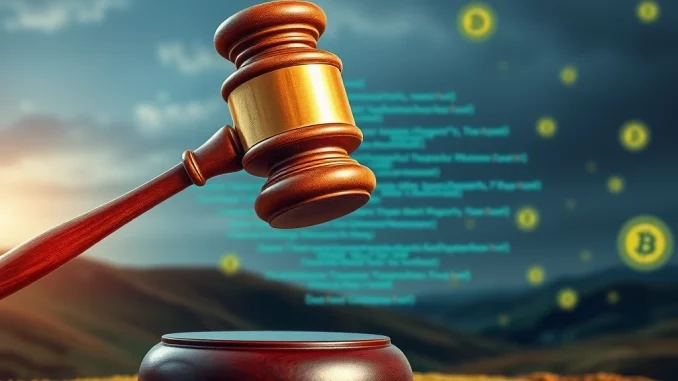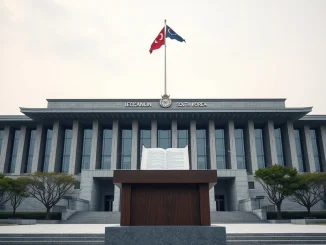
Big news just dropped from a Texas federal court that could have significant implications for the world of decentralized finance and, specifically, for users of Tornado Cash. In a landmark ruling, a judge has declared that the U.S. Treasury Department’s sanctions against the crypto mixer were unlawful, permanently blocking the agency from reimposing them. This decision is a major development in the ongoing legal battles surrounding digital asset privacy tools.
What Does the Tornado Cash Sanctions Ruling Actually Mean?
The core of the ruling is straightforward: a federal judge found that the U.S. Treasury Department, through its Office of Foreign Assets Control (OFAC), overstepped its legal authority when it sanctioned Tornado Cash in August 2022. This wasn’t a finding that crypto mixers are inherently good or bad, but rather a judgment on whether OFAC had the legal basis to sanction a decentralized, open-source software tool in the manner it did.
Key takeaways from the ruling and its background:
- Unlawful Sanctions: The judge ruled that the specific sanctions imposed by the US Treasury on Tornado Cash were not legally sound.
- Permanent Block: The ruling includes a permanent injunction, preventing OFAC from simply putting the same sanctions back in place.
- Following Precedent: This decision aligns with a prior 2023 ruling from an appeals court that also indicated OFAC had likely exceeded its authority.
- Focus on the Tool: The legal challenge centered on whether OFAC can sanction a piece of code or a decentralized protocol in the same way it sanctions individuals or entities controlled by sanctioned individuals.
For many in the crypto community, this ruling is seen as a victory for technological neutrality and a check on government power concerning decentralized protocols.
The Fight for Crypto Privacy Continues
At its heart, Tornado Cash is a tool designed to enhance crypto privacy by mixing transactions from many users, making it harder to trace funds back to their source. While proponents argue this is crucial for financial privacy in a transparent blockchain world, critics point out that it has been exploited by bad actors, including sanctioned entities and cybercriminals, to launder illicit funds.
The debate over Tornado Cash highlights a fundamental tension in the digital age:
- Privacy vs. Illicit Use: How do we protect legitimate user privacy without enabling criminal activity?
- Sanctioning Code: Can or should governments sanction open-source software that anyone can use, regardless of intent?
- Decentralization Challenges: How do traditional regulatory frameworks apply to decentralized, autonomous protocols?
The Texas ruling addresses the *how* (OFAC’s authority) rather than the *if* (whether mixers can be misused). It underscores the complex legal landscape surrounding crypto privacy tools and the challenges faced by agencies like the US Treasury in regulating decentralized technology.
Beyond OFAC: The Ongoing Legal Battles
While the Texas ruling is a significant win regarding the OFAC sanctions themselves, it’s crucial to understand that the legal troubles for those associated with Tornado Cash are not entirely over. As reported, the U.S. Department of Justice (DOJ) is still pursuing criminal charges against individuals alleged to be involved in the development and operation of Tornado Cash, including Roman Storm and Roman Semenov.
This separation is important:
- The OFAC sanctions case was a civil challenge against the Treasury Department’s *action* of sanctioning the protocol.
- The DOJ case is a criminal prosecution against *individuals* based on allegations related to their involvement with the service, potentially including charges like money laundering conspiracy and sanctions evasion.
Therefore, while Tornado Cash the protocol may be free from the US Treasury’s sanctions list based on this ruling, the developers face a separate and serious legal fight.
What’s Next for the US Treasury and Crypto Regulation?
This ruling puts the US Treasury and OFAC in a challenging position. They now have a permanent block on reimposing the same sanctions against Tornado Cash. They could potentially appeal this latest ruling, but the prior appeals court decision suggests a difficult path.
The government may need to reconsider its approach to regulating decentralized mixing services. This could involve:
- Developing new legal theories or seeking legislative clarity.
- Focusing enforcement efforts more squarely on individuals or entities who *use* such tools for illicit purposes, rather than the tools themselves.
- Engaging with the crypto industry to find solutions that balance privacy needs with anti-money laundering concerns.
The outcome of the ongoing criminal cases against the developers will also heavily influence the narrative and future regulatory actions surrounding crypto privacy tools.
Summary: A Pivotal Moment for Tornado Cash and Crypto Law
The Texas judge’s ruling that the Tornado Cash sanctions were unlawful marks a pivotal moment in the legal battle between government regulators and decentralized crypto tools. It’s a clear message to the US Treasury that its initial approach to sanctioning this specific protocol was legally flawed. While this is celebrated by many as a win for crypto privacy and a check on OFAC’s power, the story isn’t over. The separate criminal charges against the developers remind us that the legal and regulatory landscape for services like Tornado Cash remains complex and contested. This decision sets an important precedent, but the broader questions about privacy, regulation, and illicit finance in the decentralized world are far from settled.



